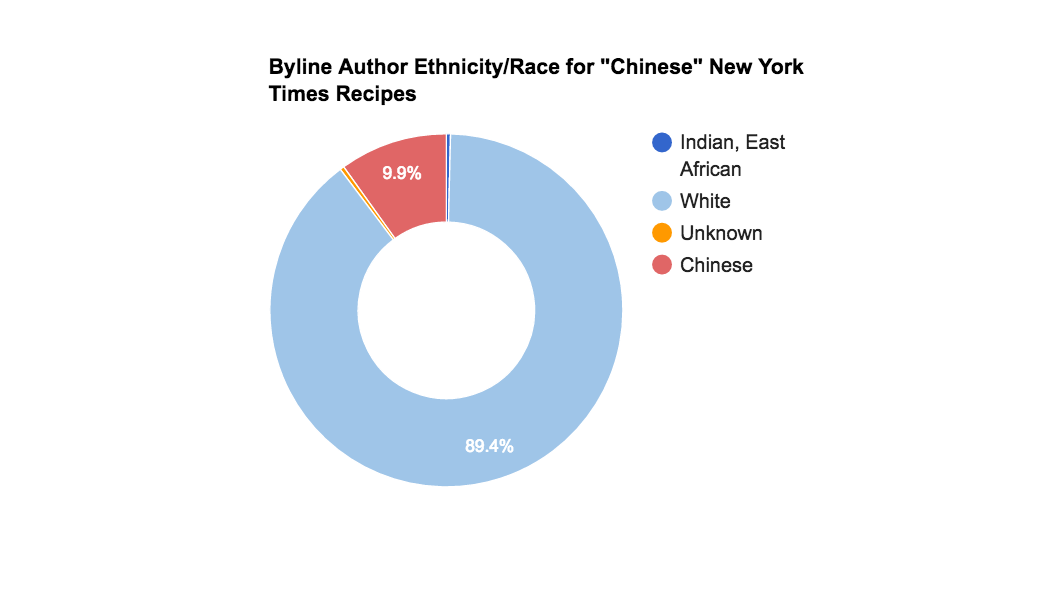


For instance, simply take a glance at a few critically acclaimed chefs/food writers and their online biographies, and you'll learn that Fuchsia Dunlop, Nina Simonds, and Carolyn Phillips (among many others) have all made a career out of specializing in Chinese cuisine, despite their whiteness. You don't need to read closely to quickly learn that they love calling themselves authorities on the food of others. According to her website, Nina Simonds is 'one of the country's top authorities on Asian cooking.' Fuschia Dunlop tops Nina - her website includes a quote saying that she is 'a world authority on Chinese cooking'.
It's not just Chinese food. Most foodies have likely heard of Rick Bayless. After spending four years travelling through Mexico to study their culinary traditions and 'test recipes', Bayless returned to America to build a culinary empire. Bayless has since published several cookbooks, owns many critically acclaimed restaurants, and is on the eleventh season of his own television show ("Mexico: One Plate at a Time"), all focusing on traditional Mexican cuisine.
To do so, I scraped recipes from the New York Times Cooking online recipes collection, which is a searchable database containing over 17,000 recipes with an enormously wide reach - the NYTFood Twitter account has over 1.25 million followers. Each recipe from the database is given a number of tags to make it searchable; and many of these recipes have tags that flag the 'ethnicity' of the cuisine. If you filter your search results to Chinese cuisine, for example, you'll get a compilation of over 260 recipes.
I wanted to know: just how many of these Chinese recipes were authored by Chinese chefs or food writers? Indian recipes by Indian chefs? Caribbean recipes by Caribbean food writers? Who is getting paid to write these recipes, and who is given a platform to share them? Ultimately, who is given the opportunity to write about how these dishes should be cooked?
Jenny Dorsey, an Asian American professional chef, food writer and social entrepreneur, says the issue comes down to trying to make food more "approachable" to whatever the hegemonic group is — in this case, white Americans. Reframing a "curry" as a "stew" might be just one example. "But food doesn't owe you being approachable," she says. "It's complicated and it has a lot of history and we owe it to food to look that up, to put in that work."
Cultural appropriation has long been a contentious topic for those in the food, according Kyla Wazana Tompkins, a professor of gender and food studies at Pomona College. Tompkins says that the "commodification of ethnicity" has become woven into the story of American food culture.
Erway remembers trying to get her second book, "The Food of Taiwan," published. She says she "just kept getting turned away. It was demoralizing to hear, over and over again: 'Asian cookbooks don't sell.'"
Eventually, she says, an editor decided they could sell it as an evergreen title. But she's always operated under the idea that a cookbook has to have a certain hook, a certain selling point. And that it has to appeal to a certain demographic. "My editor always says, 'Try to make something that ladies will buy in Barnes and Noble in the Midwest,'" Erway explains. "It's really about how much a cookbook publisher decides to throw their weight behind a certain title."
Alison Roman’s comments about Chrissy Teigen and Marie Kondo lit a fire. Here’s why it’s still burning. — The Washington Post
For women in the food world, the controversy shed light on problems that had been simmering long before

Food, Race, and Power: Who gets to be an authority on 'ethnic' cuisines? — Intersectional Analyst
by Lorraine Chuen Some of us will remember when Bon Appetit Magazine caused an uproar last September for publishing an article and video featuring Tyler Akin, a white chef, titled “PSA: This is How You Should Be Eating Pho” . The backlash, in my opinion, was justified: that a white c
As we're all cooking during the quarantine, I thought this was a pretty interesting topic.
Asian cookbooks written by Asian cooks still have trouble getting through publishers despite the growing popularity of Asian food in middle class America.
Everything in cookbooks is mostly filtered through how comfortable it makes middle America white women feel. Is this a problem? And do we need to change it?


